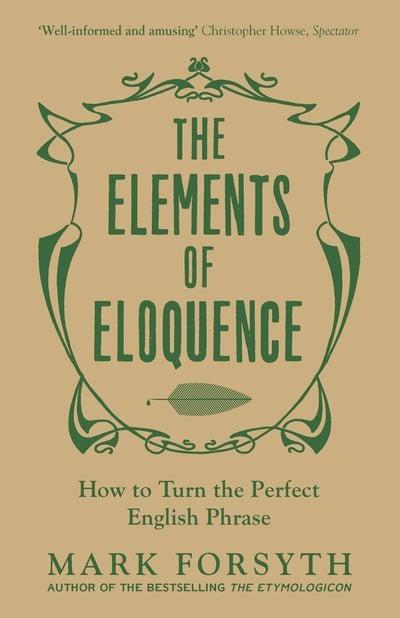What do you think?
Rate this book


205 pages, Paperback
First published November 7, 2013
38 Ways of Saying ‚ÄúThis Book is Good.‚Ä�
1. Alliteration: Verily, this vivacious volume is very diverting.
2. Polyptoton: I loved Mark Forsyth’s witty witticisms.
3. Antithesis: Some books are a slog; this book is breezy.
4. Merism: One will find many laughs in these pages, chapters, and sentences.
5. Blazon: Forsyth’s style is like a tickling feather; Forsyth’s knowledge is like a musty old volume.
6. Synaesthesia: You can smell the charm from this book, and it smells a little like daffodils.
7. Aposiopesis: This book is‚Ä�
8. Hyperbaton: Good, this book is; read it, you must.
9. Anadiplosis: Learning rhetoric leads to good style; good style leads to good writing; good writing leads nowhere (professionally speaking).
10. Periodic Sentence: One of the great things—indeed, perhaps the greatest thing—about this book, is that, throughout every paragraph and every line, lurking behind every turn of the page, and nestling within every clause, there’s a laugh.
11. Parataxis and Hypotaxis (respectively): This book is good. Although, one sometimes wonders, indeed, one often wonders, if it may be considered polite to do so, and if such wondering may not offend anybody, for wondering is often not a neutral activity, and may sometimes cut like a dagger, if used incorrectly, or perhaps correctly, depending on what one wishes to do, whether Mark Forsyth is really that bright.
12. Diacope: Read it, buddy. Read it.
13. Rhetorical Question: Why not read it?
14. Hendiadys: I read through Forsyth’s impressiveness and his knowledge.
15. Epistrophe: If you’re wondering if you should read it, you should. If you’re wondering if you should start today, you should.
16. Tricolon: The information contained within this book is useful, amusing, and probably all untrue.
17. Epizeuxis: Read. Read. Read.
18. Syllepsis: Read this book and then, if you can manage it, my mind.
19. Isocolon: Lack of rhetoric makes one seem coarse; rhetoric makes one seem mannered.
20. Enallage: Do I need to gives yous guys any mo‚Ä� reason to read this here book?
21. Zeugma: Some writers write about life; others, writing. Shakespeare is of the former; Forsyth, the latter.
22. Paradox: This book is useful and useless.
23. Chiasmus: Tomorrow, I shall write pretty sentences and phrases flowering.
24. Assonance: I read so I can feed my needs.
25. The Fourteenth Rule: There are exactly thirty-eight reasons to read this book.
26. Catachresis: Now I shall be able to write chrysanthemum phrases.
27. Litotes: This book is not unpleasant.
28. Metonymy and Synecdoche: Forsyth’s pen is skilled.
29. Transferred Epithets: On the subway, I read some chuckling sentences.
30. Pleonasm: The idea that an idea should be expressed in the tersest and briefest manner is absurd, ridiculous lunacy—and crazy, too.
31. Epanalepsis: Reviewing is tedious; I’m getting tired of reviewing.
32. Personification: Rhetoric is a beautiful, ageless maid whose face is normally hidden underneath a large hat.
33. Hyperbole: This book is the greatest book of all time and has changed my life.
34. Adynaton: If you want to resist this book’s charm, you might as well try to go skinny dipping on the sun.
35. Prolepsis: It is pretty good, this book.
36. Congeries: Forsyth uses many examples, specimens, anecdotes, excerpts, quotes, genres, and sources to tell his story.
37. Scesis Onomaton: Rhetoric: the flower of learning.
38. Anaphora: I believe that hard work pays off. I believe that good writing just takes persistence. I believe rhetoric is the key to style.

‚ÄúThe figures of rhetoric are the beauties of all the poems we have ever read. Without them we would be merely us: eating, sleeping, manufacturing and dying. With them everything can be glorious. For though we have nothing to say, we can at least say it well.‚Ä�
‚ÄúRhetorical terminology is a catastrophe and a mess.‚Ä�
‚ÄúThe aim of this book has been to make clear what is done, a clarity and knowledge that has been abandoned for a couple of centuries now.‚Ä�
When healthy people fall in love, they buy a bunch of flowers or an engagement ring and go and Do Something About It. When poets fall in love, they make a list of their loved one’s body parts and attach similes to them. Your lips are like cherries, your hair is like gold, and your eyes are like traffic lights that make my heart stop and go. These lists are almost universally awkward.About the rule of Tricolon [a list of three]:
Tricolons sound great if the third thing is longer. The American way is (as outlined in their mutinous Declaration of Independence) made up of life, liberty and the pursuit of happiness. The pursuit of happiness is, if you think about it, the least of the promises here. You can pursue happiness as much as you like, and most of us do anyway. It rarely ends in capture. Life and liberty were the more important guarantees. But it sounds so good when you go on a bit at the end.Recommended to anyone who likes English.